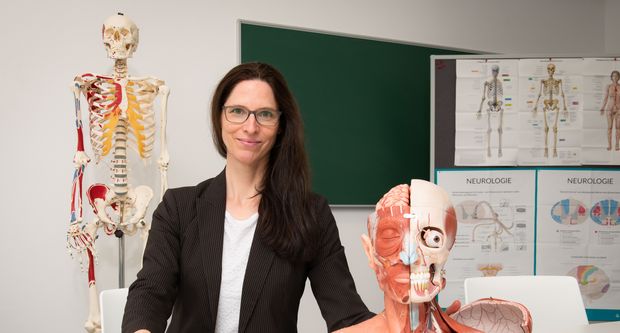Beginning May 2021, Maren Engelhardt will chair the Department of Anatomy and Cell Biology at the JKU’s Faculty of Medicine.

The native of Ulm, Germany, worked most recently at the Faculty of Medicine in Mannheim at the University of Heidelberg, focusing on innovative concepts in medical education and research. She aims to use the JKU medSPACE to expand virtual haptic anatomy and link it with the other core areas of anatomy, namely histology.
Unlike cell biology (which is more influenced by the field of natural sciences), anatomy is a core area of medicine that garners quite a lot of respect among many students. At first, the material density and many Latin terms come to mind. Maren Engelhardt remarked, "The fact is, however, that modern anatomy is a subject area that can benefit greatly from the spirit of innovation and cutting-edge possibilities in technology. In addition to base-knowledge education, I aim to inspire students and make them more aware of the functional-clinical correlations of anatomy." While at first anatomy would appear to be a subject area we know everything about, there are still always new things to discover. On one hand, anatomy is a fundamental subject as it is closely intertwined with cell biology, histology, and embryology. However, anatomy also focuses on clinical topics that require close communication with, for example, radiology, neurology and pathology. Engelhardt added: "I would like drive content-related cooperation with the clinical subject areas forward because I aim to educate and train future physicians well. If we support the next generation and retain JKU students for the long term, we will have reached an important milestone."
The Research Area of Neuroanatomy
Engelhardt's research in the field of functional neuroanatomy focuses on the brain’s so-called network activity, especially cellular communication between nerve cells. What kind of structural - and ultimately functional - changes take place inside of individual nerve cells when the environmental impressions we perceive suddenly change during developmental stages or even later in life? How do individual neurons adapt when they are part of a larger, overall structure and how does the brain prevent changing environmental conditions from upsetting this complex network each time, particularly, for example, during learning processes that people master well into old age. How do individual cells, and thereby the brain, retain the ability to adapt, something referred to in technical jargon as "plasticity"? In an effort to better understand network activity, Engelhardt's research team will explore and study these processes by using behavioral models and employing state-of-the-art microscopy techniques and electrophysiological measurements. Engelhardt added: "Although these are more basic research questions, the findings will hopefully one day directly impact treatment decisions made during everyday clinical practice. This is what motivates me every day." In cooperation with international partners, there are several ongoing studies focused on human disease models. Together with partners in Heidelberg, Salzburg and in the USA, for example, research is currently being conducted on neuronal adaptation processes after spinal cord injuries. "The goal is to continue working on these focal points here at the JKU and together with colleagues to expand more on these points."
Innovative Education at the JKU’s “medSPACE” Room
Maren Engelhardt is looking forward to discovering her new home in Linz: "The passion and dynamic atmosphere at the Faculty of Medicine are contagious and are motivating me greatly in my decision to join the JKU. The Danube, however, is a recurring symbol in my career as I was born in Ulm on the Danube, moved to Regensburg on the Danube for my doctorate, and - after a long 'detour' via Witten and Bochum in the Ruhr area - I now find myself back along the Danube once again after long stays in Los Angeles/USA and in Heidelberg."
JKU Rector Meinhard Lukas remarked, "Prof. Engelhardt will undoubtedly set new standards in medical education as she has an innovative approach and passion for anatomy. The JKU offers ideal conditions in this regard. ‘medSPACE’ will open its doors at the JKU Faculty of Medicine this fall, setting new standards as a virtual lecture hall for anatomy courses and enhancing university education by livestreaming from actual operating rooms. The virtual anatomy room will provide high-quality, vivid and photorealistic med info visualizations, including MRIs and CT scans, thereby sustainably improving the quality of education and medical training."
Elgin Drda, Vice-Rector of Medicine at the JKU and Dean of the Faculty of Medicine, added: "The subject of anatomy is a key interface between pre-clinical and clinical education, strongly characterized by an interdisciplinary nature and strong teamwork. However, it is also the foundation on which the study of human medicine is built. I am pleased to welcome Prof. Maren Engelhardt to the JKU. She is an outstanding expert in her field who is equally committed to medical education and research."
About Prof. Dr. Maren Engelhardt
Born on December 6, 1974 in Ulm, Germany, Prof. Dr. Maren Engelhardt completed her Diploma degree in biology at Ruhr-University in Bochum, Germany, and at the University of Pisa in Italy. She earned her PhD at the University of Regensburg in Germany. For many years, Maren Engelhardt was a post-doctoral researcher at the University of California at Los Angeles (UCLA) and most recently she was at the Mannheim Medical School at the University of Heidelberg in Mannheim, Germany as a Research Group Leader and Comm. head of the Institute of Microscopic Anatomy and Histopathology.
When she’s not working, Maren Engelhardt is drawn to water and the mountains. She is looking forward to discovering Upper Austria’s fascinating alpine region.








